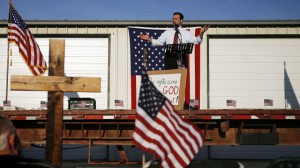
Supporters of Americans For Prosperity and other tea party members rally at Leo O’Laughlin Inc. on the eve of President Barack Obama’s visit to Macon, Missouri. Tuesday evening, April 27, 2010. (Photo by Patrick T. Fallon/AP)
It’s widely understood that the government has been shut down by a relatively small number of Republican lawmakers who represent deeply red districts. They’re insulated from public opinion at large. They don’t fear a general election loss to a Democrat; they’re motivated by avoiding a primary challenger from their right flank.
So to fully understand what’s driving the Republican Party’s brinkmanship, one has to look at the motivations of its base voters – how they see the world around them. This lies at the heart of what’s happening in the Capitol today.
Democracy Corps – a Democratic-leaning polling firm – released a study this week based on a series of focus groups they conducted with loyal Republican voters. They divided them up into three sub-groups which together represent the base of the party. Evangelicals represent the largest group, followed by Republicans who identify with the tea party movement. “Moderates,” the third group, make up about a quarter of the party’s base, according to the pollsters.
Fear of a changing society is one thing that unites all three factions. The battle over Obamacare, write the study’s authors, “goes to the heart of Republican base thinking about the essential political battle.”
They think they face a victorious Democratic Party that is intent on expanding government to increase dependency and therefore electoral support. It starts with food stamps and unemployment benefits; expands further if you legalize the illegals; but insuring the uninsured dramatically grows those dependent on government. They believe this is an electoral strategy — not just a political ideology or economic philosophy. If Obamacare happens, the Republican Party may be lost, in their view.
And while few explicitly talk about Obama in racial terms, the base supporters are very conscious of being white in a country with growing minorities. Their party is losing to a Democratic Party of big government whose goal is to expand programs that mainly benefit minorities. Race remains very much alive in the politics of the Republican Party.
They worry that minorities, immigrants, and welfare recipients now believe it is their “right” to claim [public] benefits. Tea party participants, in particular, were very focused on those who claim “rights” in the form of government services, without taking responsibility for themselves.
They are also unified in their belief that Obama is a usurper who has hoodwinked the public into re-electing him by hiding his true beliefs, which are essentially Marxist. They also think that Democrats have won the major political battles of our time because Republican legislators in Washington didn’t put up a fight.
But there are also deep divisions within the base, according to the analysis. Evangelicals still focus overwhelmingly on social issues. They think gay rights are the biggest threat to our society, but they also worry about the loss of what they see as an idyllic small-town culture. They feel besieged as the cultural ground shifts beneath them, and see themselves as a beleaguered, “politically incorrect” minority.
Tea partiers display a libertarian streak, and are far less concerned with social issues. They are staunchly pro-business. But there’s an easy alliance between these two groups – which make up well over half of the GOP base – because evangelicals think the tea partiers are fighting back, and vice versa.
Both groups displayed a high level of paranoia, according to the researchers who conducted the study. They noted that this was the first time, in many years of conducting focus groups, that participants worried that their participation might trigger surveillance by the NSA or an audit by the IRS. In addition to thinking that Obama is a liar, and a covert Communist, these two groups were also more likely to express the belief that he is secretly a Muslim.
The moderates were, as one might expect, quite different. Like the tea partiers, they don’t worry as much about social issues. Their concerns are traditionally conservative – they worry about excessive regulation and taxation. They have a hard time taking Fox News seriously, and hold a deep disdain for the tea party faction. They are also keenly aware of their waning influence within the coalition.
Moderates are not so sure about their place in the current Republican Party. They worry about the ability of Republicans in Congress to make government work. They believe the party is stuck, not forward-looking, and representative of old ideas. They worry about the Republican Party’s right turn on social and environmental issues — which makes it difficult, especially for young moderates — to view the Republican Party as a modern party.
Unlike the tea partiers and evangelicals, the moderate faction desperately wants lawmakers in Washington to find a common middle ground. They are less likely to worry about unauthorized immigration than the rest of the base, and some went so far as to speak positively about immigrants’ contributions to our society and economy.
Climate change is another dividing line between moderate Republicans and the hard-right. GOP moderates may be unsure of the science on climate change, but they don’t reject it out of hand, and some are legitimately worried about the effects of a changing climate.
In this, they stand out from the evangelical and tea party wings. The study’s authors write:
Moderates are not even in the same conversation as evangelicals who deeply doubt scientists writ large and Tea Party Republicans who are consumed by the big government and regulations that inevitably result from climate science.
Evangelicals and Tea Party Republicans share and are consumed by skepticism about climate science — to the point where they mistrust scientists before they begin to speak.


